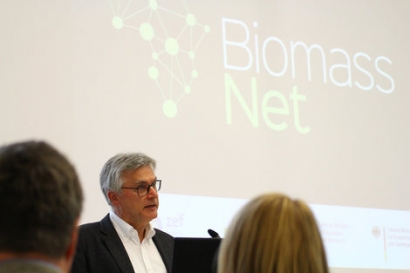
More than 80 experts from Germany and Africa met in Bonn, Germany, on 12th July 2017 for the launch of the world’s first pan-African network for non-food biomass. The aim of the new network is to ensure that food security and environmental sustainability are not compromised by the development of new uses for biomass, while also helping to strengthen emerging African bioeconomies. The inauguration of the network was opened by Dr. Manfred Denich, project director of BiomassWeb.
“Africa, especially south of the Sahara, needs biomass both as a source of food and as a source of energy and industrial raw materials” said Dr. Manfred Denich, Director of the BiomassWeb project at the Center for Development Research at the University of Bonn (ZEF). “In order to provide solutions to this problem, we need an improved exchange of knowledge and experience, as well as discussions with local partners. Scientists, politicians, businesses and civil society must work together”.
Under the umbrella of the BiomassWeb project, German and African scientists are investigating how biomass can be used more effectively and efficiently in Africa. This is a problem because of the scarcity of agricultural land coupled with an expanding population. Estimates by the United Nations predict a population of almost two billion people in sub-Saharan Africa by 2050, almost double the figure in 2010. In association with the emerging impacts of climate change, this means that most sub-Saharan African countries are not able to produce enough food.
For these reasons, researchers from the BiomassWeb project are developing methods to improve food production and minimise post-harvest losses, such as spoilage. However, they are also exploring ways in which innovative processing techniques can increase the income of small-scale farmers, thus making them more resilient to potential crises. Inedible manioc peels, for instance, can serve as a substrate for mushroom cultivation, while maize residue can be used to produce bio-oil or syngas.
The Centre for Development Research, together with the Forum for Agricultural Research in Africa (FARA), has now set up the first pan-African expert network on food and non-food biomass, the core of which is the interactive web portal Biomassnet.org. The network is aimed at experts all over the world working in science, policy and practice and interested in biomass in Africa. In particular, the network will promote an exchange of knowledge and information relating to biomass on the African continent. According to ZEF project leader Dr. Christine Schmitt, it is intended to initiate new collaborations, approaches and innovative solutions for the African biomass sector, beyond the boundaries of sectors and traditional expertise.
Image: Dr. Manfred Denich, project director of BiomassWeb, opening the BiomassNet.org inauguration and networking meeting.
For additional information:

